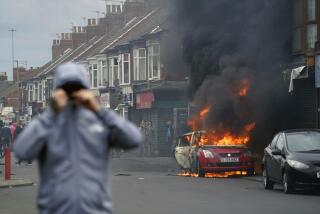Official Pelted as British Riots Go On; 2 Dead
- Share via
LONDON — Two people were found dead in a burned-out post office, and a member of the British Cabinet was pelted with bricks and bottles Tuesday as police fought running battles with black youths for the second day in a slum neighborhood of the industrial city of Birmingham.
More than 30 police officers and firemen have reportedly been injured since violence erupted late Monday in Birmingham’s Handsworth district, a predominantly immigrant community of West Indians, Pakistanis and Indians. More than 50 buildings have been destroyed by fire.
On Tuesday, Britain’s new home secretary, Douglas Hurd, traveled to Birmingham, the nation’s second-largest city with about 1 million people, 110 miles northwest of London. Hurd went there to survey the worst civil unrest in Britain since rioting swept through the racially mixed neighborhoods of several large cities in the spring and summer of 1981.
He had been on the scene only a few minutes when an angry crowd of black youths began showering him with rocks and bottles.
“I am here to listen,” Hurd pleaded, but he was quickly shouted down. Ruffled but unhurt, he was hustled into a police van and driven away.
Bands of youths then roamed the streets of the Handsworth district, as they did Monday night, setting cars on fire, pelting police with rocks and firebombs and attacking shops.
The neighborhood remained tense late Tuesday, with officers still out in force. By early today, sporadic street fighting had again broken out. Police in Handsworth were attacked by youths with gasoline bombs, Reuters news agency reported, and there were accounts of trouble in two other Birmingham districts, Moseley and Balshall Heath.
Geoffrey Dear, a West Midlands police chief constable who accompanied Hurd on Tuesday, said he had advised the home secretary not to visit the area but that Hurd “asked to come and see what had happened. It was a matter of principle.”
Prime Minister Margaret Thatcher, currently touring Scotland, pleaded for elements of the racially mixed, riot-torn community to join hands to end the violence.
“We must condemn it and make sure it doesn’t happen again,” she said. “Everyone must unite--the local government (and) ethnic leaders. . . .”
High Unemployment Noted
Opposition Labor Party leaders, however, called Thatcher’s remarks hypocritical, saying that the riots were the result of her government’s neglect of urban problems, particularly high unemployment and an absence of public services.
They accused her of failing to implement recommendations for reform made by a government commission in the wake of 1981 riots.
“It’s political claptrap for the prime minister to say we must make sure these things never happen again,” charged Gerald Kaufman, the Labor Party’s spokesman on domestic affairs. “They happened four years ago and hardly anything recommended . . . has been carried out.”
Kaufman and other opposition figures also hardened their attack on efforts by Thatcher and her Cabinet to reduce spending on local government, saying that to press such cutbacks would only lead to further inner-city deterioration in Britain and more violence.
Handsworth, a district with overcrowded housing, high unemployment rates and few recreational facilities, is one of the most depressed urban areas in the country. The entire city’s unemployment rate is estimated as high as 20%, 7 points above the national jobless rate, and authorities say that most black youths in Handsworth are out of work.
Poverty ‘No Justification’
Hurd, at a news conference, said the government has spent $26 million in Birmingham to improve housing and to alleviate other community problems. He ruled out unemployment and deprivation as the causes of the riot, although he described them as “an evil in themselves.”
“There is no justification why those conditions should lead people to loot, burn, put people’s lives at risk,” he said.
The Handsworth area was also hit by violence in 1981, but a strong community relations program involving the police was credited with containing the unrest at levels below that in the Brixton section of south London and the Toxteth area of Liverpool, two of the neighborhoods worst affected by that round of rioting.
That community relations program appeared to be functioning last weekend when a neighborhood festival, opened by the local police chief, went off peacefully and was acclaimed as the most successful in years.
However, civic leaders in Birmingham said Tuesday that conditions in Handsworth always made the area a potential flashpoint. Former regional police chief David Webb, who helped set up the community relations program, was not surprised at the outbreak of violence.
“When you have conditions like that,” he said, “all it needs is a single incident to set it off.”
Parking Infraction
A police attempt to issue a parking ticket to a black motorist Monday afternoon was believed to have been the incident that triggered the new violence. About four hours later, a group of black youths, mostly of Caribbean descent, set fire to a local bingo hall and the rioting was under way. Fire units dispatched to the initial blaze were forced to retreat under a hail of rocks, bricks and homemade firebombs.
Asian families and the small shops they own appeared to have born the brunt of the violence, although local officials and representatives of both blacks and Asians said Tuesday that relations between the two communities were generally good.
More to Read
Sign up for Essential California
The most important California stories and recommendations in your inbox every morning.
You may occasionally receive promotional content from the Los Angeles Times.













